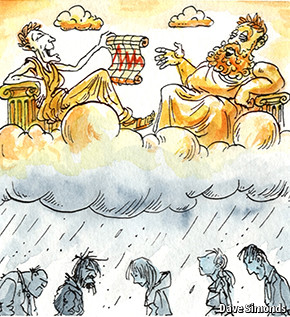Para los que aún creen que la economía es ciencia, esto de The Economist.
A new paper looks at how economists became so influential

“IF ECONOMISTS could manage to get themselves thought of as humble, competent people, on a level with dentists, that would be splendid!” said John Maynard Keynes, a British economist. Despite their collective failure to predict the financial crisis, let alone follow Keynes’s injunction, economists are still very influential. They write newspaper columns, advise politicians and offer expensive consulting services to business-folk far more than other academics. A new paper* tries to explain why.
One reason, say the authors, is that economists have come to believe that they are superior. A survey in 1985 found that just 9% of graduate students in economics at Harvard strongly believed that economics was “the most scientific of the social sciences”. But as economics became ever more mathematical, its practitioners grew in self-confidence. By 2003 54% of the graduate economists studying at Harvard strongly agreed with the statement. A glance at a popular blog for doctoral students in economics, econjobrumors.com, gives a taste of the contempt in which its users hold other disciplines. Sociologists “play around with big important ideas without too much effort or rigour,” one econo-nerd asserts.
The authors point out that economists demonstrate their self-belief in subtler ways too. Articles in the American Economic Review cite the top 25 political-science journals one-fifth as often as the articles in the American Political Science Reviewcite the top 25 economics journals. Another study found that American economics professors were less likely than their peers in other subjects to agree with the notion that “interdisciplinary knowledge is better than knowledge obtained by a single discipline.”
The odd thing, the authors argue, is that we believe in economists almost as much as they believe in themselves. Journalists and politicians seek strong arguments and clear answers. Most academics are reticent types: historians, for instance, question whether you can learn anything from history. “For a moderate fee,” jokes Deirdre McCloskey, an economic historian, “an economist will tell you with all the confidence of a witch doctor that interest rates will rise 56 basis points next month or that dropping agricultural subsidies will increase Swiss national income by 14.8%.”
* “The superiority of economists”, by M. Fourcade, E. Ollion and Y. Algan, MaxPo Discussion Paper 14/3.
No hay comentarios:
Publicar un comentario